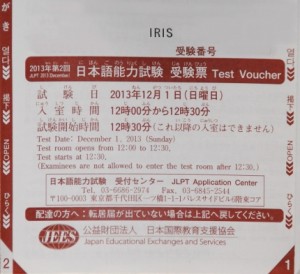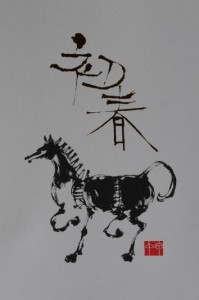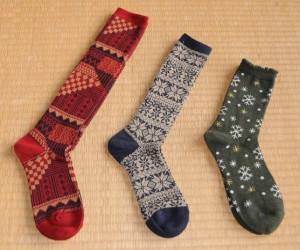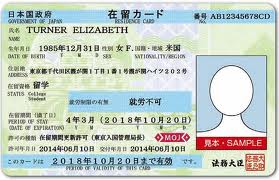Yesterday I have received the test voucher for the JLPT test on December 1st. It is a very small, postcard sized piece of paper (actually it’s A5, but folded in half) with the bare essentials necessary for the test.
The first page contains my address, the test date and time and the number of the JLPT application centre.
The second page has dire ctions to the test site. I was hoping that I only had to go to Kyoto University around the corner, but my test is in another university to the South of Kyoto. At least I can take the subway line that is relatively close by the house. It is interesting that it says here “DON’T telephone the test site for directions.” I can only assume that the university there doesn’t know about the test – or, at least not the random person who would pick up the phone on a Sunday morning…
ctions to the test site. I was hoping that I only had to go to Kyoto University around the corner, but my test is in another university to the South of Kyoto. At least I can take the subway line that is relatively close by the house. It is interesting that it says here “DON’T telephone the test site for directions.” I can only assume that the university there doesn’t know about the test – or, at least not the random person who would pick up the phone on a Sunday morning…
The third page is all about me: name, photo, registration number, date of birth, more details as to the test site; and what test I’m taking and when the test hours are. This is the page I actually need to take – together with a picture ID.
The last page contains a list of general instructions. It covers “Items to bring to the test” (test voucher, writing instruments – pencils and plastic erasers taken out of their cases – wristwatch), “cautions – yellow cards” (for things like: starting before permission is given, a ringing phone, speaking and eating during the test, engaging in what looks like cheating, copying the questions, disturbing the other examinees), and “cautions – red cards” (immediate disqualification for things like: ringing phone during the listening examination, cheating, taking the test for another person, taking the questions outside of the room, leaving the examination before having permission.) Some of the instructions seem harsh (alarm watches to check the time are not allowed), others common sense (speaking during the test), it should be no problem for me though.
What’s interesting about the test voucher is that it is mostly in Japanese and English; the Japanese is written properly, i.e., containing all the Kanji at the right places, but it comes with Furigana. The instructions on the last page are only written in English and, as you have to tear off the third page for the test, the “tear here” is written in Korean, Chinese, English, and Japanese Hiragana. Funny, isn’t it?
Anyway, it’s two more weeks – time to get nervous?






